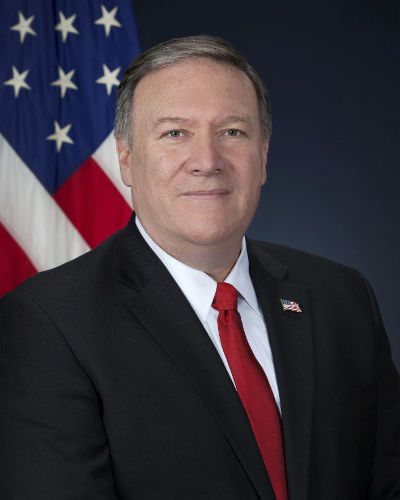Secretary of state visits Iowa, talks trade

Courtesy of US Department of State
Mike Pompeo
March 4, 2019
Secretary of State Mike Pompeo toured the Des Moines area Monday, visiting FFA students, Gov. Kim Reynolds and the Iowa Farm Bureau, among other organizations to discuss the State Department’s role in American safety, trade and recruiting young, diverse voices to the State Department.
Pompeo’s visit comes shortly after President Donald Trump’s summit with North Korean leader Kim Jong Un and the day after reports that the United States and China are nearing a deal to rollback tariffs which have been impacting Iowa farmers.
Pompeo said he is hopeful an agreement will be reached within the month and believes a lot of progress has been made in the negotiations.
“I’ve been around a lot of these complex negotiations,” Pompeo said. “They can fall apart. Things can happen. They’re not easy conversations for sure, but we’ve made real progress. The Chinese have agreed to things that they have never agreed to before, and I’m very hopeful.”
Jonathan Hassid, an associate professor in political science and China specialist, said the Chinese government has previously agreed to deals similar to the one being negotiated this month, such as when they joined the World Trade Organization in 2001, but those deals have not been enforced.
“Getting an agreement with China is very different from having the Chinese government enforce that agreement,” Hassid said. “The Chinese government has promised over and over again … that they would respect copyrights and foreign intellectual property. They haven’t.”
The tariffs on soybeans and other agricultural goods are a result of a larger trade war between the United States and China, which Pompeo said he believes is being more seriously addressed by Trump than any of his predecessors.
The tariffs have resulted in lower soybean prices since they were imposed in 2018, and associate professor of economics Chad Hart said they caused a “major disruption” in the markets at the time.
Hart said the soybean markets initially saw a 25 percent price decrease but have since begun to recover as countries other than China, formerly the biggest importer of American soybeans, have begun buying more soybeans from the United States. He estimated the impact on Iowa’s economy was between $1 to 2 billion.
The Trump administration has issued billions of dollars in aid to farmers throughout the time the tariffs have been in place, which Hart said has helped mitigate the impact to farmers this year because the aid came during the time soybeans would normally be sold.
“In the long run, [whether the money comes from trade or aid] does matter,” Hart said. “If it’s just aid, it’s aid for one year, and that’s the big question going forward. If this dispute will be going on through the rest of 2019, farmers will still be facing lower incomes, and will there be some sort of government support to fill in that hole?”
Pompeo’s visit also comes amid the parade of Democratic presidential hopefuls campaigning across Iowa, and political science department chair Mack Shelley said he “would be shocked if [Pompeo’s visit wasn’t] related” to the campaign season.
The trip also comes days after Trump met with Kim regarding U.S.-North Korea military relations, which Shelley said could have led Pompeo to do “damage control” during his visit to make up for negative coverage of the summit.
Pompeo said a main goal of the trip is to talk with leaders across the state about “the State Department’s role in keeping Americans safe,” and to talk to FFA members about opportunities to get involved with the State Department.
“I want [students] to know that the United States Department of State is out working for them, and we would love to have some of them come work for the State Department … and see the great opportunities we have there,” Pompeo said.
















